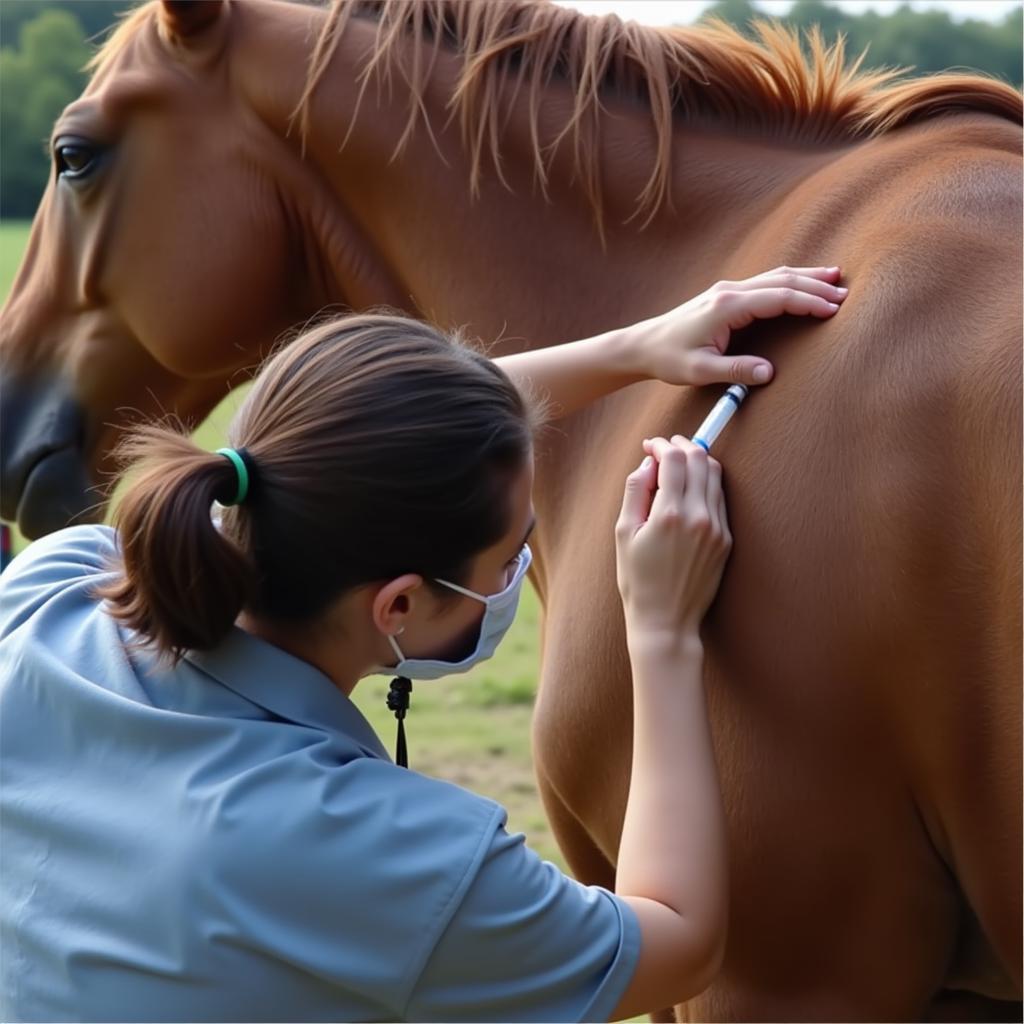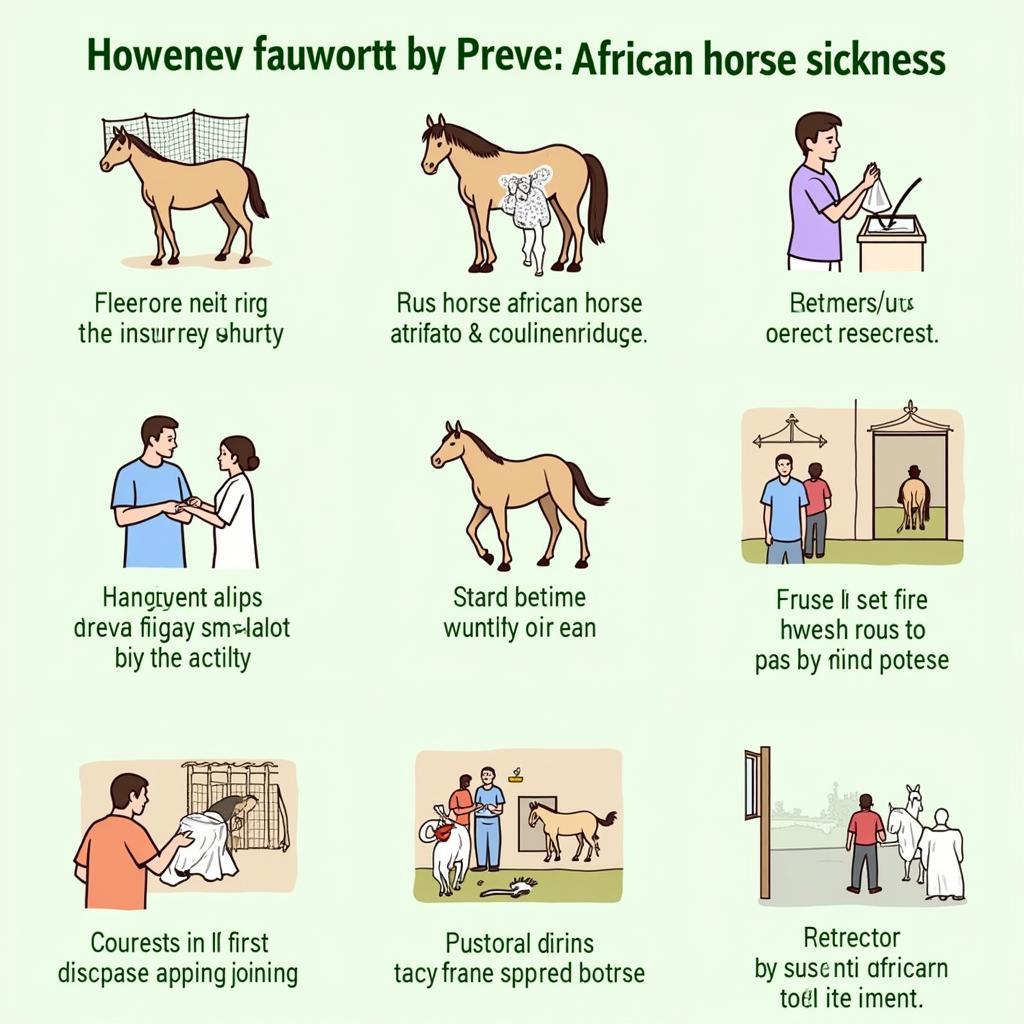African Horse Sickness Vaccine: Your Comprehensive Guide
African Horse Sickness Vaccine is crucial for protecting equines from this deadly viral disease. This guide explores everything you need to know about the vaccine, from its different types to its effectiveness and administration. Learn how to safeguard your horses from African horse sickness.
Understanding African Horse Sickness and the Need for Vaccination
African horse sickness (AHS) is a devastating disease that can decimate horse populations. Characterized by respiratory and circulatory compromise, AHS often proves fatal. African horse sickness prevention emphasizes the importance of vaccination as a cornerstone of effective disease management. The virus, transmitted by biting midges, spreads rapidly, making vaccination essential, especially in high-risk areas.
Types of African Horse Sickness Vaccine
Several types of African horse sickness vaccines exist, each with its own advantages and disadvantages. Live attenuated vaccines, while effective, carry a small risk of causing mild forms of the disease. Inactivated vaccines, on the other hand, are generally safer but may require more frequent booster shots. Understanding the nuances of each vaccine type is crucial for making informed decisions about your horse’s health.
Live Attenuated Vaccines
These vaccines utilize a weakened form of the virus to stimulate an immune response. While highly effective, they require careful handling and storage.
Inactivated Vaccines
These vaccines use killed virus particles, making them safer than live attenuated vaccines, but often requiring more frequent boosters to maintain immunity.
Administering the African Horse Sickness Vaccine
Proper administration is critical for ensuring the vaccine’s effectiveness. African horse sickness virus structure plays a crucial role in vaccine development. Vaccines are typically administered intramuscularly by a veterinarian. Following the recommended vaccination schedule and booster protocols is essential for long-term protection.
 Veterinarian Administering AHS Vaccine
Veterinarian Administering AHS Vaccine
Effectiveness and Duration of Immunity
While no vaccine is 100% effective, the African horse sickness vaccine offers significant protection against the disease. The duration of immunity varies depending on the type of vaccine used and the individual horse’s immune response. Regular booster vaccinations are crucial for maintaining adequate protection.
Boosters and Maintaining Immunity
Booster vaccinations are essential to ensure ongoing protection. The frequency of boosters depends on the type of vaccine used and the prevailing risk of AHS in the area.
The Importance of Biosecurity Measures
While vaccination is a crucial component of AHS prevention, it should be combined with robust biosecurity measures. African horse sickness ppt often highlights the importance of integrated approaches to disease management. This includes controlling midge populations, using insect repellents, and restricting horse movement during outbreaks.
Dr. Sarah Jones, a leading equine veterinarian in South Africa, emphasizes, “Vaccination is just one piece of the puzzle. Implementing comprehensive biosecurity measures is crucial for effectively managing AHS.”
Addressing Common Concerns about the Vaccine
Some horse owners express concerns about potential side effects of the vaccine. While mild reactions such as swelling or tenderness at the injection site can occur, serious side effects are rare. African horse fever transmition vector explains how the virus spreads, highlighting the importance of vaccination.
 Biosecurity Measures for AHS
Biosecurity Measures for AHS
Dr. Michael Davies, an expert in equine infectious diseases, adds, “The benefits of vaccination far outweigh the potential risks. Protecting your horses from this deadly disease is paramount.”
African Horse Sickness Vaccine: Protecting Your Equine Companions
The African horse sickness vaccine is a vital tool in protecting horses from this devastating disease. By understanding the different vaccine types, administration protocols, and the importance of booster vaccinations, you can take proactive steps to safeguard your equine companions. Remember, combining vaccination with strong biosecurity measures offers the most effective protection.
FAQ
- How often should my horse receive the AHS vaccine?
- Are there any side effects associated with the vaccine?
- What should I do if I suspect my horse has AHS?
- Can vaccinated horses still transmit the disease?
- How effective is the vaccine in preventing AHS?
- What is the cost of the AHS vaccine?
- Where can I get my horse vaccinated against AHS?
Scenarios where you might need the African Horse Sickness vaccine:
- You are planning to travel with your horse to an area where AHS is prevalent.
- You live in an area where AHS outbreaks have occurred in the past.
- You are bringing a new horse onto your property and want to protect your existing herd.
- Your veterinarian recommends vaccination as part of a comprehensive preventative health program. African horse sickness 2019 shows the importance of vigilance.
Further Reading and Resources
Explore more about African Horse Sickness:
- AHS prevention strategies
- AHS virus structure
- Understanding AHS transmission vectors
If you need assistance, please contact us at: Phone Number: +255768904061, Email: [email protected] or visit us at Mbarali DC Mawindi, Kangaga, Tanzania. We have a 24/7 customer service team.

